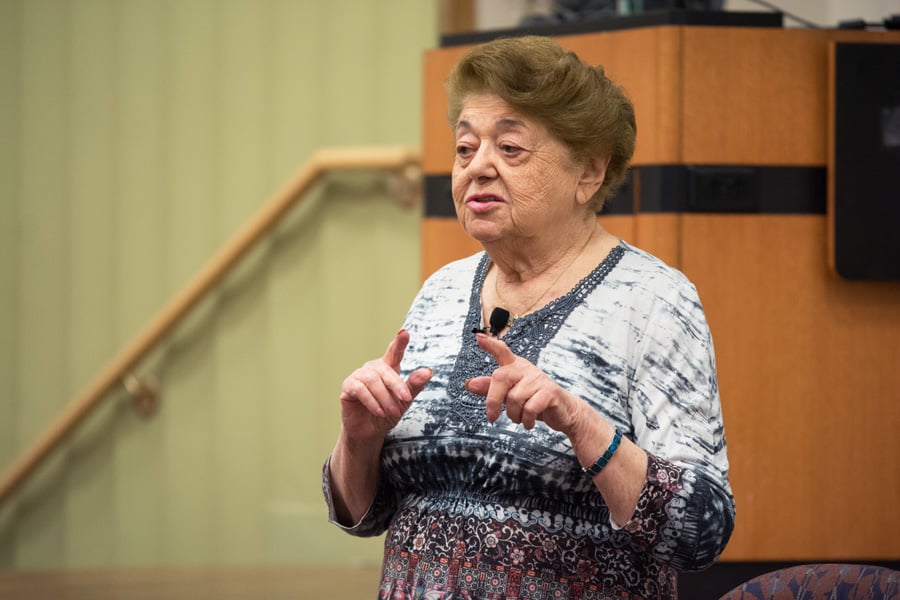Holocaust survivor shares stories of hope, resilience at Holocaust Remembrance Day event
Oreste Visentini/The Daily Northwestern
Holocaust survivor Magda Brown shares her experiences at Auschwitz-Birkenau as part of a series of events held to commemorate Holocaust Remembrance Day. She said her message to her audience is protect your freedom, think seriously before hating and remind people that the Holocaust is a true historical event.
April 26, 2017
Holocaust survivor Magda Brown’s will to live remained strong even after she was sent to the Auschwitz-Birkenau concentration camp at age 17, where she became “unrecognizable” — her head was shaved and she was forced to wear a long slip dress and wooden flip-flops, which doubled as pillows.
Brown recalled her experiences in the concentration camp during a visit to Northwestern on Tuesday evening.
“This is the most painful moment for a teenager’s body,” Brown said. “From the adjacent room, there were some girls coming out, screaming … almost unrecognizable.”
After surviving the harsh conditions of a concentration camp and World War II, Brown continues to share her story. She spoke to about 50 people in Fisk Hall during a speech that was part of a series of events hosted by Fiedler Hillel and several other student groups in commemoration of Holocaust Remembrance Day, which is April 24.
In her speech, Brown reminded the audience that the Holocaust is a true historical event and told students to protect their freedom and think seriously before hating others.
Hillel’s Religious Life co-vice president Yadid Licht said it is important for students to continue to remember history and take away these lessons.
“It’s important because remembering also implies action in the present and the ‘never again’ sort of mindset,” the Communication junior said.
Brown spoke about how the Holocaust changed her life. Showing a picture of herself in her youth, Brown said she was just like any other young girl before the Holocaust. Her life changed after the area around her home became a “ghetto” where Jews were sent and her family began sheltering refugees, she said.
“I was a spoiled brat,” Brown said. “I had my own room. I had my own space. I had my own stuff. This is when I learned how to share. It was the only way to do it.”
Brown, who is from Miskolc, Hungary, boarded the train to the Auschwitz-Birkenau concentration camp on her 17th birthday on June 11, 1944. Brown said she stood for three days straight in a car filled with up to 80 people and two buckets; one used as a toilet and the other filled with water. The worst part, she said, was that the water bucket was never refilled, and thirst became all she could think about.
Upon arrival, Brown said her group went through a cleaning process that made people “unrecognizable.” Girls were shaven bald, disinfectant was sprayed on their recently-shaved, sensitive skin and they were all given large, baggy clothing and slippers with wooden soles.
“The only way we’d recognize our best friend is we would look into their eyes and hear their voice,” she said.
Two months later, Brown was “selected” to work in a factory in Allendorf, Germany, where she was exposed to hazardous material without appropriate attire. Yet even under the most difficult conditions, Brown said she told herself, “Maybe tomorrow will be better.”
When sent on a death march to the Buchenwald concentration camp, Brown escaped with a handful of other girls and was liberated by two soldiers who were staying in a barn nearby. Later, she said, she contacted her relatives in the United States, who sponsored her immigration.
After a Hillel trip to Auschwitz-Birkenau, SESP freshman Talia Meidan said she had a revelation about the importance of focusing on educating and learning about the Holocaust because it is a “horrific but impactful event.”
“We are the last generation that will hear first-hand what happened during the Holocaust, and I think that is the biggest gift that we can be given,” she said. “I think that it’s extremely important for us to use that in the future, so every opportunity I get to listen to a survivor, I do.”
Email: catherinekim2020@u.northwestern.edu
Twitter: @ck_525


